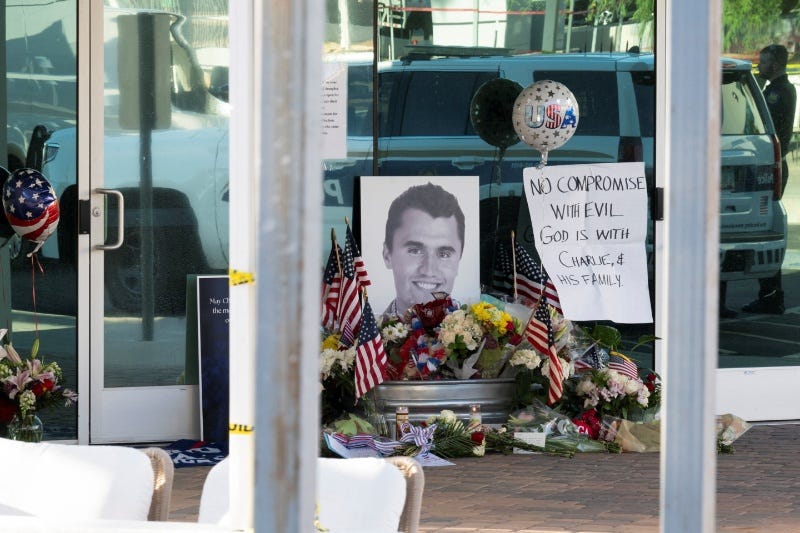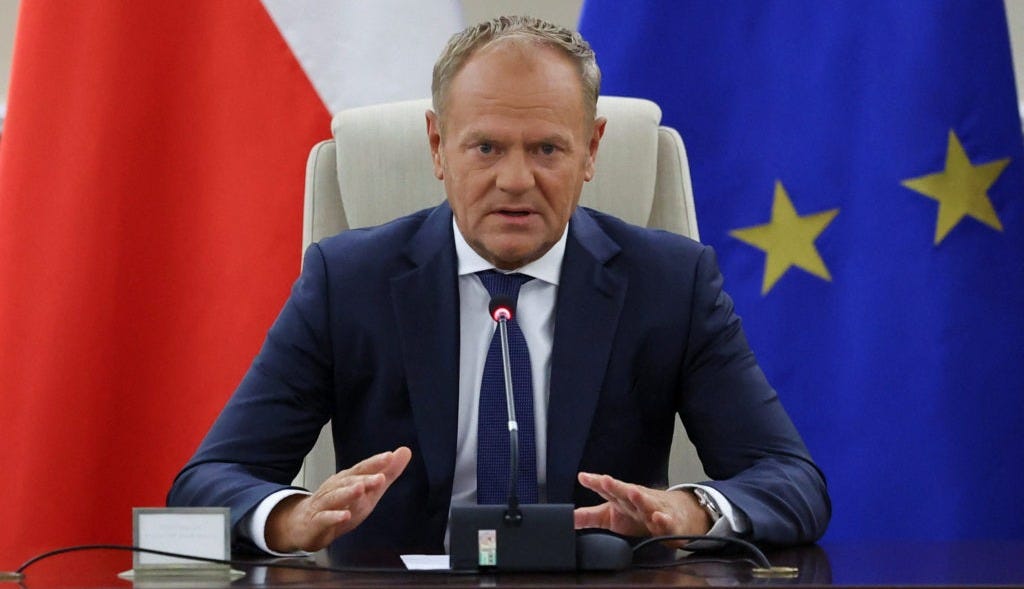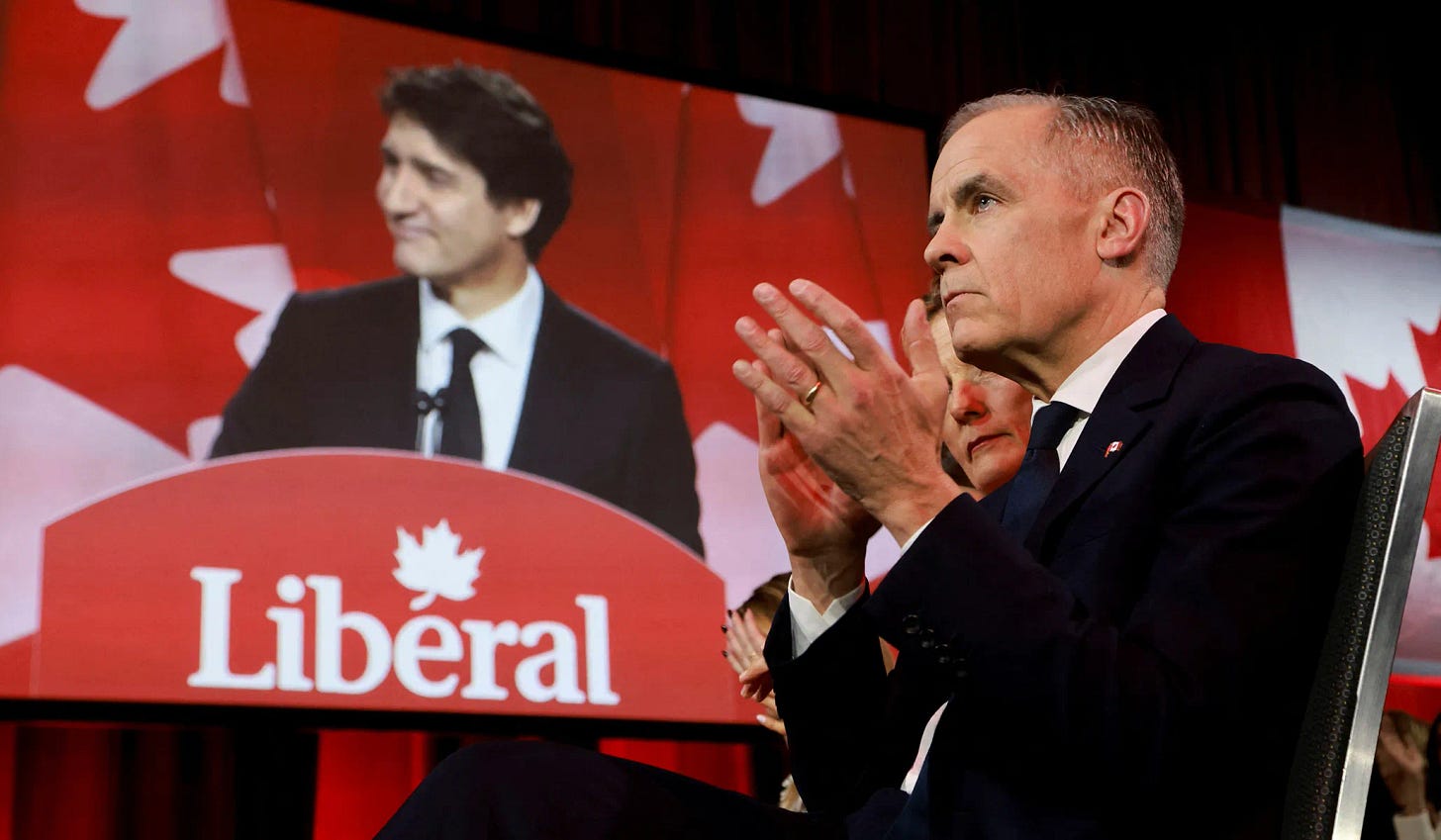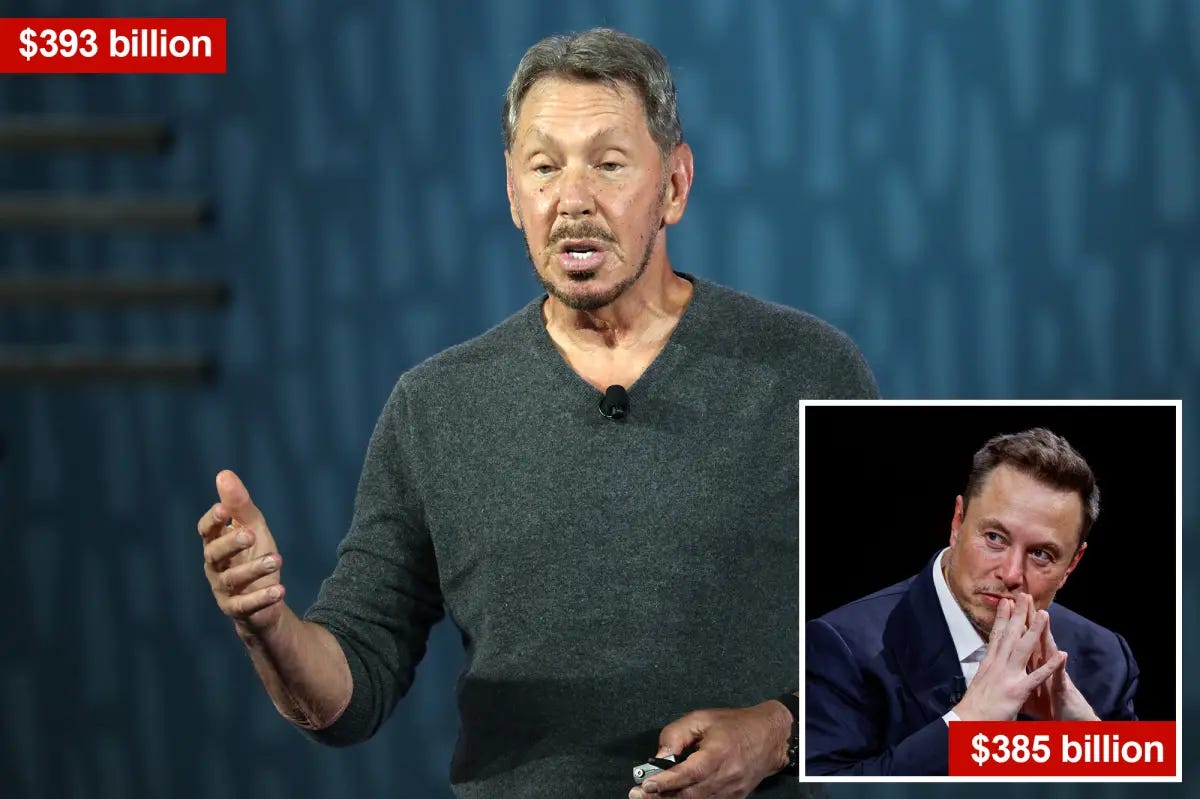Good morning, it’s Thursday, September 11th. In today’s news, Charlie Kirk’s assassination marks the crossing of an invisible line, a majority of Canadians no longer feel safe in their own neighbourhoods, Poland invokes NATO Treaty Article 4 after Russian drones shot down in Polish airspace, calls mount for Carney government to revive Trudeau-era Online Harms Legislation, and much more.
First time reading the daily blend? Sign up here.
Have We Crossed an Invisible Line?
The Assassination of Charlie Kirk and the Escalation of Political Violence
Charlie Kirk was shot and killed during a Turning Point USA event at Utah Valley University. The single bullet struck him in the neck while he was taking audience questions. He was transported to a regional hospital and later pronounced dead.
Utah’s governor Spencer Cox immediately condemned the act as a “political assassination.” After initial confusion, including brief detentions, police now say no suspect is in custody. A manhunt is ongoing.
Shock, Condolence, and Disturbing Reactions
The reaction across the country has been intense. Many have expressed sorrow, anger, and concern. Yet a shockingly large number of commentators—even some with influence—have expressed glee.
Konstantin Kisin remarked that “tonight feels like some sort of invisible line has been crossed that we didn’t even know was there.” He said the last time he felt that way was on 9/11, when it was obvious—before knowing any details—that the world was about to change forever.
If we properly understand how we arrived at this moment—step by step, through years of shifting rhetoric and normalization of punishment for dissent—then we are better able to see where we are headed next.
Assassination Culture
Charlie Kirk had long warned about what he called “assassination culture spreading on the left.”
Those warnings are now backed by data. A survey conducted by the Network Contagion Research Institute (NCRI) found that 55.2% of respondents who identify as “left of center” said it would be at least somewhat justified to murder President Donald Trump, while 48.6% said the same about Elon Musk.
The NCRI report also identified the emergence of an “assassination culture” in online communities, where political violence is increasingly normalized.
And this isn’t confined to the digital fringe. Consider:
A University of Toronto professor declared: “Shooting is honestly too good for so many of you fascist cunts.”
On MSNBC, Matthew Dowd floated the idea that Kirk’s own fans may have shot him: “We don’t know if this was a supporter shooting their gun off in celebration. So we have no idea about this.” He then added: “He’s been one of the most divisive, especially divisive younger figures… hateful thoughts lead to hateful words, which then lead to hateful actions. And I think that is the environment we are in.”
On social media, one viral post with more than 169,000 likes reads: “Maybe Charlie Kirk shouldn’t have spent years being a hateful demagogic fascist and this wouldn’t have happened. Maybe he should take some personal responsibility.”
On Instagram, when Kirk’s widow posted in grief, leftist commenters left mocking replies about their children “not having a dad anymore,” accompanied by laughing emojis.
These are not just isolated trolls. These are professors, national news analysts, and millions of social media users openly celebrating a political assassination.
The New York Times: A History of Language Games
The New York Times headline announcing Kirk’s death read:
“Charlie Kirk, Right-Wing Force and a Close Trump Ally, Dies at 31”
And the opening sentence began:
“Charlie Kirk, a conservative wunderkind who through his radio show, books, political organizing and speaking tours did much to shape the hard-right movement…”
The framing is not subtle. The Times made a deliberate decision to foreground his political identity. He was not primarily presented as a man who was murdered, but as a “Right-Wing Force,” a “Trump Ally,” and someone who helped “shape the hard-right movement.”
Translated into the leftist lexicon, the message is unmistakable: Charlie Kirk was Hitler’s ally, a fascist, and he was extremely effective at promoting the fascist movement. This is not exaggeration. This is exactly how the ideological left interprets such framing. In their psyche, this was not the assassination of a citizen in a democracy — it was the removal of a dangerous enemy, someone whose death was both predictable and, in some sense, deserved.
And this is not a one-off misstep. The New York Times has a long history of minimizing or excusing ideological violence when it aligns with socialism. It was the Times that won a Pulitzer Prize for Walter Duranty’s reporting on the Soviet Union, which infamously covered up Stalin’s genocidal famine in Ukraine. Duranty downplayed or outright denied millions of deaths, offering propaganda cover for one of history’s greatest mass murders—driven not by ignorance, but by his ideological sympathies for Marx and Stalin.
By presenting Kirk’s death as simply that of a “divisive figure” who “died,” the Times continues this tradition of linguistic laundering: reframing atrocities into politics, stripping moral clarity from murder, and shifting the focus from victim to ideology.
The signal to the public psyche is clear: this was not an assassination that should shock us all — this was politics as usual.
The “Scientists of Utopia”
Underlying this descent is a conviction that has long animated radical leftist movements: the belief that they possess the scientific and incontestable truth about how society must operate. They see themselves as engineers of a utopia, determining who gets what, who works where, who may speak, and who must be silenced.
Anyone who resists this “truth” is branded not merely wrong, but evil — a “right-wing reactionary,” a “fascist.” And, as the University of Toronto professor revealed, once you’re labeled “fascist,” even a bullet is too merciful.
This is not fringe rhetoric. These are professors, public school teachers, national news commentators, and newspapers of record. Institutions signalling — loudly — that assassination is tolerable if directed at the right targets.
From Reputation to Violence: The Leftist Psyche’s Descent
It didn’t happen all at once. The acceptance of political violence has been a gradual conditioning process.
2010–2015 — Reputation destruction. At first, it was enough to ruin reputations and remove social status. Disagreement was reframed as violence. If you dared to question their ideas, you weren’t simply wrong — you were harmful. Speech itself was cast as dangerous, something to be suppressed.
2016–2020 — Cancel culture. When people continued to disagree, the goal shifted to repetitional annihilation. Entire careers destroyed, families shamed, communities ostracized.
2021–2023 — Censorship and structural punishment. During the COVID years, dissenters were stripped of the most basic rights of daily life. You could lose your job. You could be banned from speaking publicly. You could be denied the right to travel, to eat at restaurants, to attend school, to work and provide for your family. In short: your right to participate in society itself was erased.
2023–2025 — Structural exile. Citizens jailed for social media posts. People erased from professional and social life. Exile — which the human psyche has always equated with death — was now an accepted punishment for ideological disagreement.
2025 — Direct violence normalized. With Kirk’s assassination, the mask is off. Crowds cheered. Professors excused it. MSNBC anchors ran cover. The New York Times softened it. The leftist psyche has fully accepted that if someone is branded “fascist” or “reactionary,” then violence is permissible.
What Comes Next?
If this trajectory continues, there are only two stages left:
Mass killings openly cheered. Not just one political figure, but entire crowds targeted and applauded.
Genocide. The final stage of totalitarian movements — violence legitimized on a massive scale.
Every authoritarian movement has passed through these thresholds unless stopped. The disturbing truth is that we are now witnessing the shift into open celebration of assassination.
A Virus in the Political Mind
The tragedy of Charlie Kirk’s death must be recognized for what it is: the normalization of political violence.
And this normalization is being amplified not by fringe trolls, but by professors, teachers, news anchors, and newspapers of record.
The signal being sent to every unstable, violent person in society is clear: if you kill someone we disagree with, we will cover for you.
A stronger virus requires a stronger immune response. We must begin treating radical “social justice” ideology not as a political movement, but what it truly is: a terrorist ideology, no different in essence from neo-Nazism or radical jihadism.
That means removing anyone associated with such ideologies from positions of authority. By law.
Because if we do not, the next stages are clear. And history tells us where they end.
The assassination of Charlie Kirk is not simply a crime. It is an inflection point.
The not-so-invisible line has been crossed. The only question is whether society recognizes the danger before the slope becomes irreversible.
Canada in Crisis: Majority of Canadians No Longer Feel Safe in Their Own Neighbourhoods
There was a time when Canada was defined by its safety. A country where doors were left unlocked, neighbours looked out for one another, and crime felt like something that happened elsewhere. That Canada is gone.
A new Postmedia-Leger poll paints a sobering picture of a nation that no longer feels secure in its own skin. More than half of Canadians say they don’t feel safe in their own neighbourhoods. Even more troubling, a majority believe the justice system is stacked against the very citizens it was built to protect.
Here are the key poll results by the numbers: 87 percent of respondents support the right to use reasonable force against an intruder—a number that climbs to 92 percent in Manitoba, Saskatchewan, and among older Canadians. That conviction is not an abstraction. It comes in the wake of a high-profile case in Lindsay, Ontario, where a homeowner who defended himself against a crossbow-wielding intruder was the one charged with aggravated assault. The incident sparked outrage, prompting Premier Doug Ford to declare the justice system “broken.”
Beneath these debates runs a deeper current of unease. 51 percent of Canadians admit they worry about their safety at home, a number that peaks among middle-aged parents and homeowners. And more than half—54 percent—say the courts and laws no longer serve law-abiding citizens. In British Columbia, that figure rises to nearly 60 percent.
What these numbers reveal is not just anxiety, but erosion of trust, of faith, of the old promise that Canada was a place apart. When citizens no longer feel safe in their own neighbourhoods, when they stop believing the justice system will stand on their side, the social contract frays. Respect for the law collapses when the law itself feels like the enemy.
Canada’s reputation as a safe haven is slipping away. The unlocked-door nation has vanished, replaced by one where people are looking over their shoulders and wondering if the country they thought they knew is already gone.
Poland Invokes NATO Treaty Article 4 After Russian Drones Shot Down in Polish Airspace
Poland has invoked Article 4 of the NATO treaty after Russian drones crossed into its airspace during overnight attacks on western Ukraine, marking the first time NATO has formally responded to an incursion. Article 4 of the NATO treaty is a consultation mechanism that allows any member country to request a meeting of the alliance when it believes its territorial integrity, political independence, or security is threatened.
Prime Minister Donald Tusk reported around 19 drones entered Polish territory, with several shot down, while NATO and allied forces, including Dutch, German, and Italian units, scrambled jets and deployed missile defenses. The move has sparked widespread concern in Europe, with leaders from Sweden, the UK, Lithuania, and Canada pledging support for Poland and warning of escalating Russian aggression. NATO consultations are ongoing, and officials stress the incident underscores the broader threat Russia’s war in Ukraine poses to European security. More
Calls Mount for Carney Government to Revive Trudeau-Era Online Harms Legislation
Calls are mounting for Prime Minister Mark Carney’s government to revive Trudeau-era efforts to regulate tech companies under a new online harms bill, ostensibly aimed at protecting children from exploitation, deepfakes, and harmful content. But critics warn the legislation, as currently drafted, is a wolf in sheep’s clothing—it gives regulators sweeping powers over platforms, imposes egregious fines, and risks becoming a broad censorship tool under the guise of child safety.
What’s striking is that even right-wing media, which would normally oppose such heavy-handed regulation, is framing the story largely around protecting kids rather than warning about the law’s potential to stifle free speech and digital innovation. With ministerial responsibility unclear and the government preoccupied with economic agendas and US pressure, Canada’s digital regulation risks handing regulators unprecedented power over tech giants—while Canadians remain largely unaware of the sweeping consequences. This bill must be stopped before it becomes law. More
France Paralyzed as ‘Block Everything’ Protests Erupt Over Austerity Cuts - The “Block Everything” movement launched nationwide strikes and blockades against €43.8 billion in austerity cuts, sparking mass arrests, heavy police deployment, and rising fury at President Emmanuel Macron. More
Federal Agents Target Sinaloa Drug Cartel in Nationwide Crackdown, Arresting 617 Suspects - The DEA seized thousands of pounds of drugs, including fentanyl, methamphetamine, cocaine, and heroin, along with cash and firearms. More
Nepal Protests Grow More Violent as Protesters Torch Government Buildings and Attack Politicians - More
Islamic State-linked Rebels Attack Funeral in East Congo, Killing at Least 61 People - More
UN: Obese Children Surpass Undernourished Youth for First Time in History - More
Trump Presses EU to Target China, India With Up to 100 Percent Tariffs Over Russia Ties - The president has also criticized Europe for failing to fully break with Russian energy. More
Oracle Rockets Nearly 40% in One Day as Ellison Becomes Richest Man in the World
Oracle shares surged nearly 40% in a single session after reporting a 359% jump in future revenue obligations and massive gains in its MultiCloud AI database business. CEO Safra Catz highlighted multibillion-dollar AI cloud contracts with major tech firms including OpenAI, Meta, Nvidia, and AMD, while founder Larry Ellison projected continued explosive growth. The rally pushed Oracle’s market value close to $1 trillion and catapulted Ellison past Elon Musk to become the world’s richest person, adding over $100 billion to his current net worth of $393 billion. More
Whistleblowers Tell US Congress Meta Put Virtual-Reality Profits Over the Safety of Kids After Shutting Down Negative Studies - More
Uber and Pipe Team Up to Offer Restaurants Access to Working Capital - More
Trump’s Net Worth Jumps to $7.3 Billion, Vaulting Him Up Forbes 400 List - More
Space Travel Accelerates Stem Cell Aging, Raising Major Health Risks for Astronauts
A new NASA-backed study finds that spaceflight accelerates aging in human stem cells, reducing their ability to regenerate and weakening the immune and blood systems. Using AI-monitored bioreactors aboard the ISS, researchers observed that microgravity and cosmic radiation overstimulate stem cells, causing them to burn through energy reserves, activate hidden “dark genome” DNA, and enter a stress-induced decline.
While stem cells can recover after returning to Earth—over roughly a year—the findings raise serious concerns for long-duration space travel, highlighting the need to understand how space environments affect the human body before committing to extended journeys to the Moon, Mars, or beyond. More
Scientists Say NASA's Perseverance Finds the Most Compelling Signs of Ancient Life in Martian Rocks - More
Canadians to Watch at the Track and Field World Championships
The World Athletics Championships kick off this weekend in Tokyo, featuring a strong Canadian contingent, including four defending world champions. Camryn Rogers and Ethan Katzberg aim to repeat their historic hammer throw victories, while Marco Arop looks to challenge Kenya’s Emmanuel Wanyonyi in the 800m. Damian Warner and Pierce LePage face injury and form concerns in the decathlon, and the men’s 4x100m relay team hopes to replicate their past Olympic and world title upsets. Other medal contenders include Sarah Mitton in shot put, Moh Ahmed in long-distance races, Evan Dunfee in race walking, and rising 400m hurdles star Savannah Sutherland. The championships run through September 21st. More
Anthony Rizzo Retiring as Member of the Chicago Cubs After 14 MLB Seasons - More
Actor James McAvoy Punched at Toronto Bar, Apparently Unprovoked, While in the City for TIFF - More
Toronto Condo Sues Church for $2.3M Alleging Drug Trafficking and Violence on Property
A Drunken Raccoon's Life Was Saved By a Nurse Performing CPR After it Nearly Drowned in Moonshine
On This Day in 1783, Benjamin Franklin wrote, “There never was a good war or a bad peace,” reflecting his enduring belief that conflict brings destruction and suffering, while peace, even when imperfect, is always preferable. This timeless observation continues to resonate as a reminder of the high cost of war and the value of diplomacy.


















"The incident sparked outrage, prompting Premier Doug Ford to declare the justice system “broken.”"
If only there was someone in government who could introduce and pass legislation to fix the broken justice system. Oh well.
Honestly, we crossed the invisible line years ago. If an identifiable group of people wish harm, even death, to others for their personal medical choices, their political views, spurred on by a malevolent ruling class and MSM, well, we crossed the Rubicon didn't we. Not to be despondent, but the world is a different place now, is it intentional, by design? I believe so, any number of theories abound but none are meant to improve our existence.